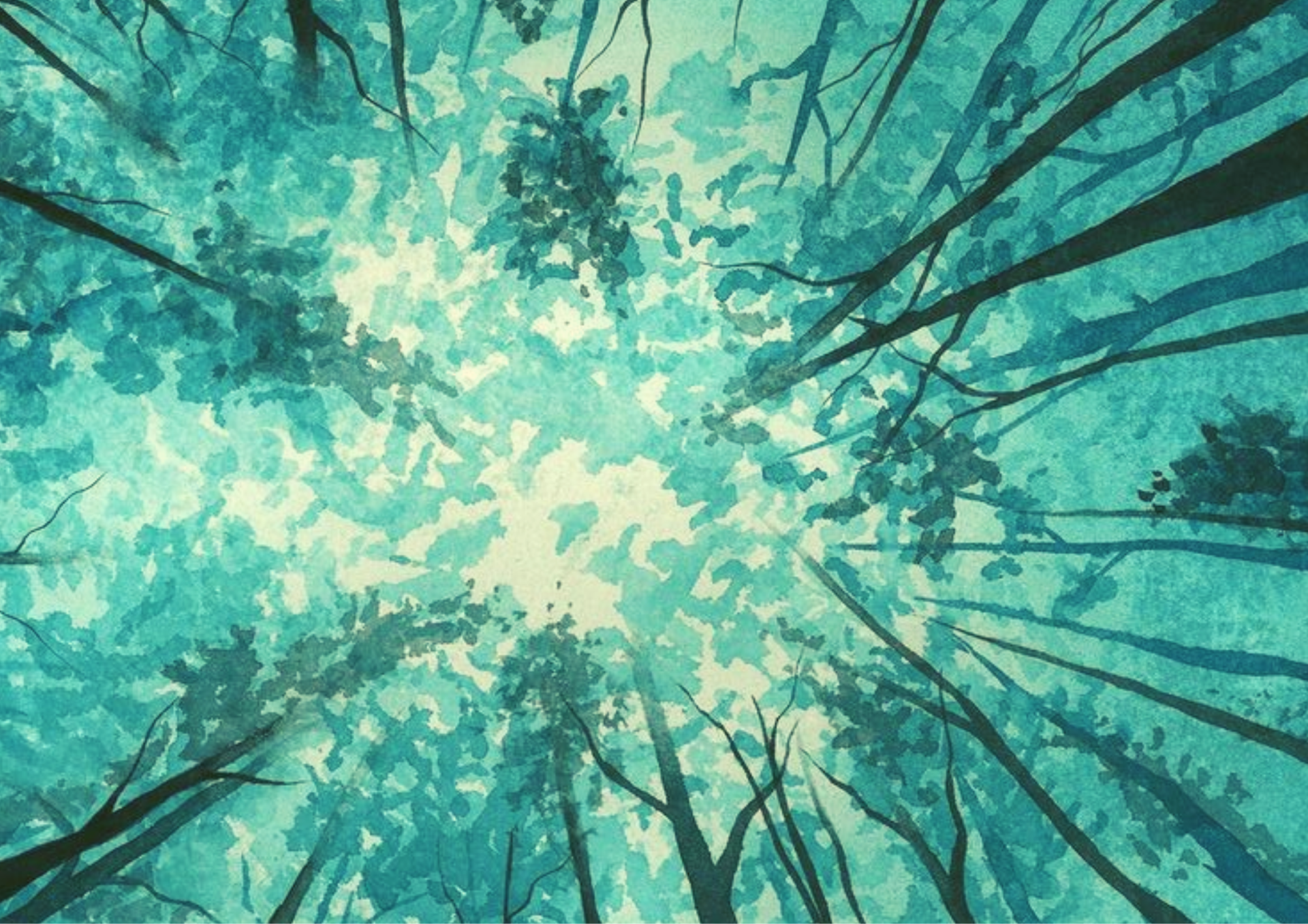
From despair to active hope
12th Nov - 10th Dec 2022
This 5 weeks journey will be a combination of online gatherings, workshops, talks, social media and email engagements that take us into the depth of the challenges that the Anthropocene brings to our lives, and collectively find our way through- by providing spaces for creative self-expression and sharing.
The current state of the world presents us with unprecedented dilemmas. With every passing day, it overwhelms us with its unending complexity, ever-unfolding challenges, and unfathomable injustice and suffering, demanding multi-scale, multi-sector solutions and actions with ever increasing urgency.
As individuals, we oscillate between strong emotions (such as despair, guilt, hope fear, anxiety, empowerment, anger, sadness) and not feeling anything at all (numbness/ frozen).
This is natural, given the complexity and enormity of the challenges that we are facing- when our actions seem futile, when solutions turn in to problems within a short time, when it is so hard to fully comprehend the state of the world and our place in it, when the monstrous storm of poly-crises is raging its head, taking every bit of certainty with it.
Perhaps, through navigating the inner landscape of our embodied selves, we could find pathways to courageous imaginations for our outer worlds.
Perhaps, slowing down together, engaging in creative expressions of our selves, and witnessing each other, could help us co-create new ways to be human, one that emerges from active hope, a hope that is based on our own active participation in transformation of the world.
Please register by submitting your name and email address
By clicking register, you agree to share your email address with the site owner to receive updates, and other emails. You can opt out at any time.
Online events schedule
12th Nov - 3 to 4:30pm IST
Opening Talk
Suprabha Seshan
Rainforest Etiquette in a world gone mad
19th Nov - 3 to 5:30 pm IST
Workshop
Shayantoni Gosh & Lakshmi Venugopal
Emotional Resilience as a community practice
23rd Nov - 3 to 4:30pm IST
Conversation on creative self-expression
Poorva Goel
26th Nov - 3 to 5pm IST
Conversation on creative self-expression
Sukrit Sen & Wangũi wa Kamonji
Special event
1st Dec - 6 to 8 pm IST
Story telling
Alyen Foning & Minket Lepcha
Rememberance day for lost species
3rd Dec - 3 to 4:30 pm IST
Conversation on creative self-expression
Meena Subramaniam
10th Dec - 10 to 11:30 am IST
Closing talk
Danielle Celermajer
Conversation on “Summertime”
You’ll find the recording for each session at the bottom of this page or on our YouTube channel
The journey starts with information about the Anthropocene, climate anxiety, and solastalgia, and an opening talk by Suprabha Seshan on the 12th Nov, followed by a workshop on emotional resilience on the 19th Nov, co-facilitated by Lakshmi Venugopal and Shayontoni Ghosh.
Email and social media engagements and prompts will be dispersed between the sessions, to guide your own self paced explorations.
Then, we explore how creative engagement with the Anthropocene can support us in the movement from despair to active hope. Sessions with artists, Sukrit Sen, Wangũi wa Kamonji, Poorva Goel and Meena Subramaniam, to explore their creative engagement with this topic, followed by small creative offerings as prompts for the wider community, as an invitation to engage with your grief, frustration, anger, numbness, and fear around the Anthropocene.
The closing talk, on the 10th Dec will be a conversation with Danielle Celermajer on her deep engagement with her experience of the Australian bushfires through writing her book, Summertime.
Meet the artists, and facilitators invited to accompany us in this journey
Suprabha
Seshan
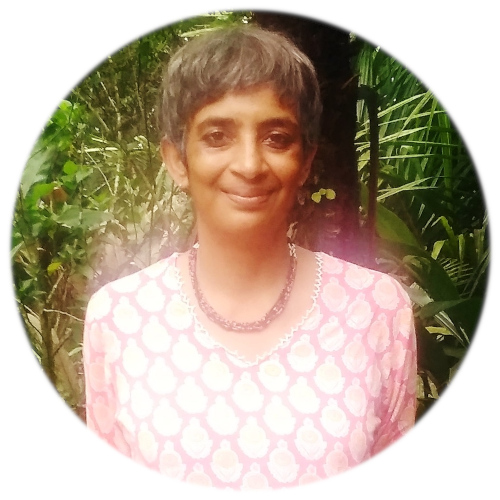
“Come forth into the light of things, let nature be your teacher.” – William Wordsworth.
And she did that.
Read more
Suprabha is a conservationist and environmental educator committed to the rewilding of habitat and human beings. She lives and works at the Gurukula Botanical Sanctuary (GBS) in the Western Ghat Mountains in India. Learning from nature to protect nature better is the work of GBS, through its integrated conservation practices in land, species and community-based ecological nurturance. On behalf of the GBS team, Suprabha received the prestigious Whitely Award for Nature in 2006.
Shayontoni
Ghosh
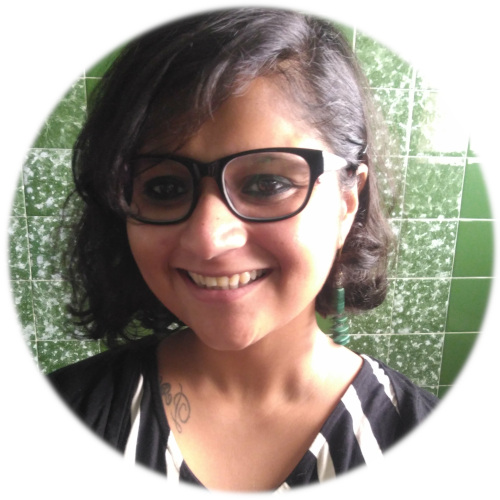
Shayontoni Rhea Ghosh creates art and holds space for self-reflection and healing. She is a writer, a theatre-artiste and a facilitator, and is building a creative healing studio called DOT.
Poorva
Goel
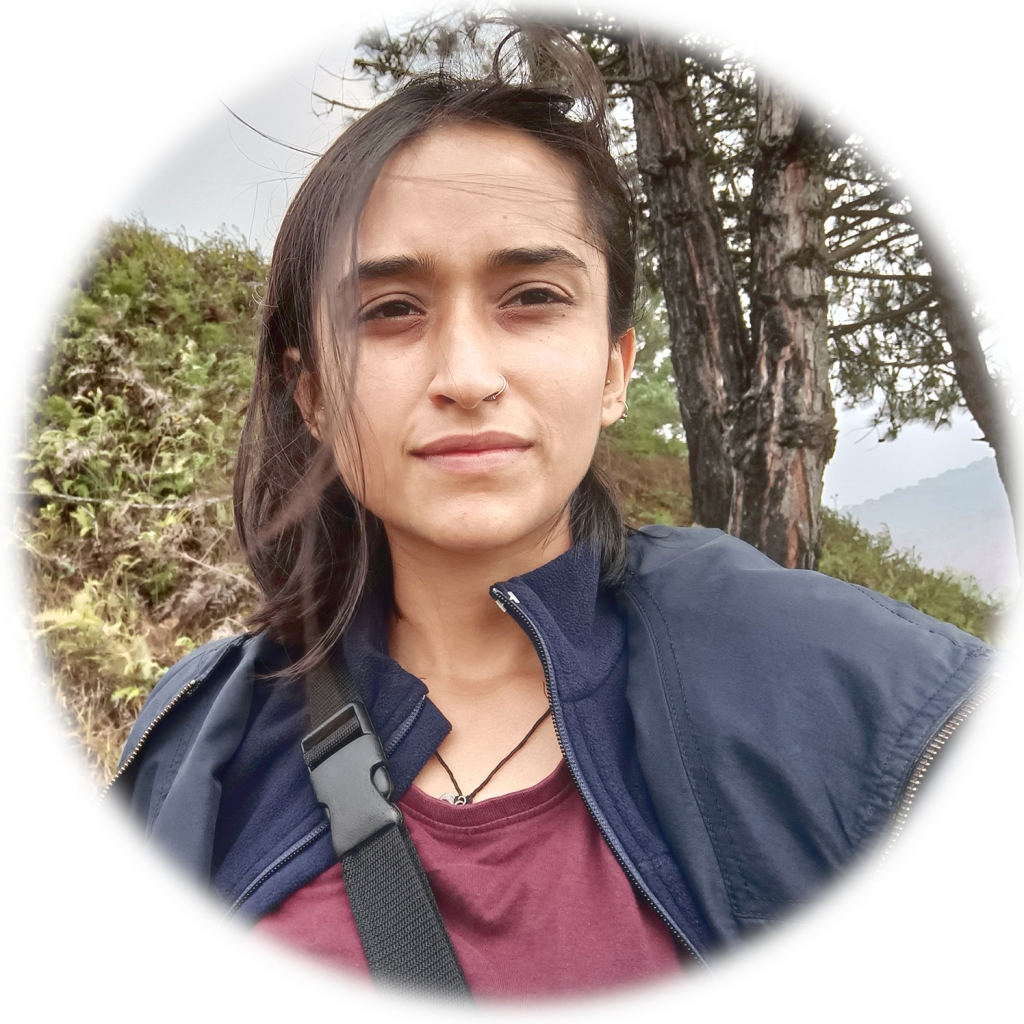
Poorva is a cartoonist and graphic storyteller who has been working on themes of social and ecological justice and is interested in documenting people, places and paradigms.
Sukrit
Sen
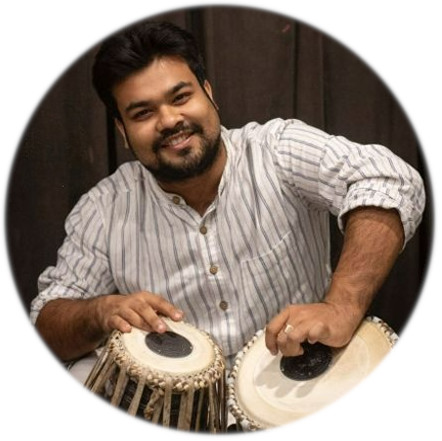
Sukrit is a Heritage and Disaster Management professional during the day and a musician by night
Read more
He has been associated with Indian Classical Music for over 2 decades now and has collaborated with various artists and performed all around the globe. Primarily trained in the Tabla, he also plays many other folk percussion instruments such as the Srikhol, Morsing, Ghatam, Kanjira, Mridangam, Djembe, Cajon, etc.
Apart from live concerts he has also designed music for several theatre acts and has been a part of a number of background movie scores for the Bengali Film Industry.
As a part of his organization the Living Waters Museum, he has been working around water and its association with music for a couple of years now and he has been working with students in India and the US to look at the role of music and creative arts in advocating climate action.
Wangũi
wa Kamonji
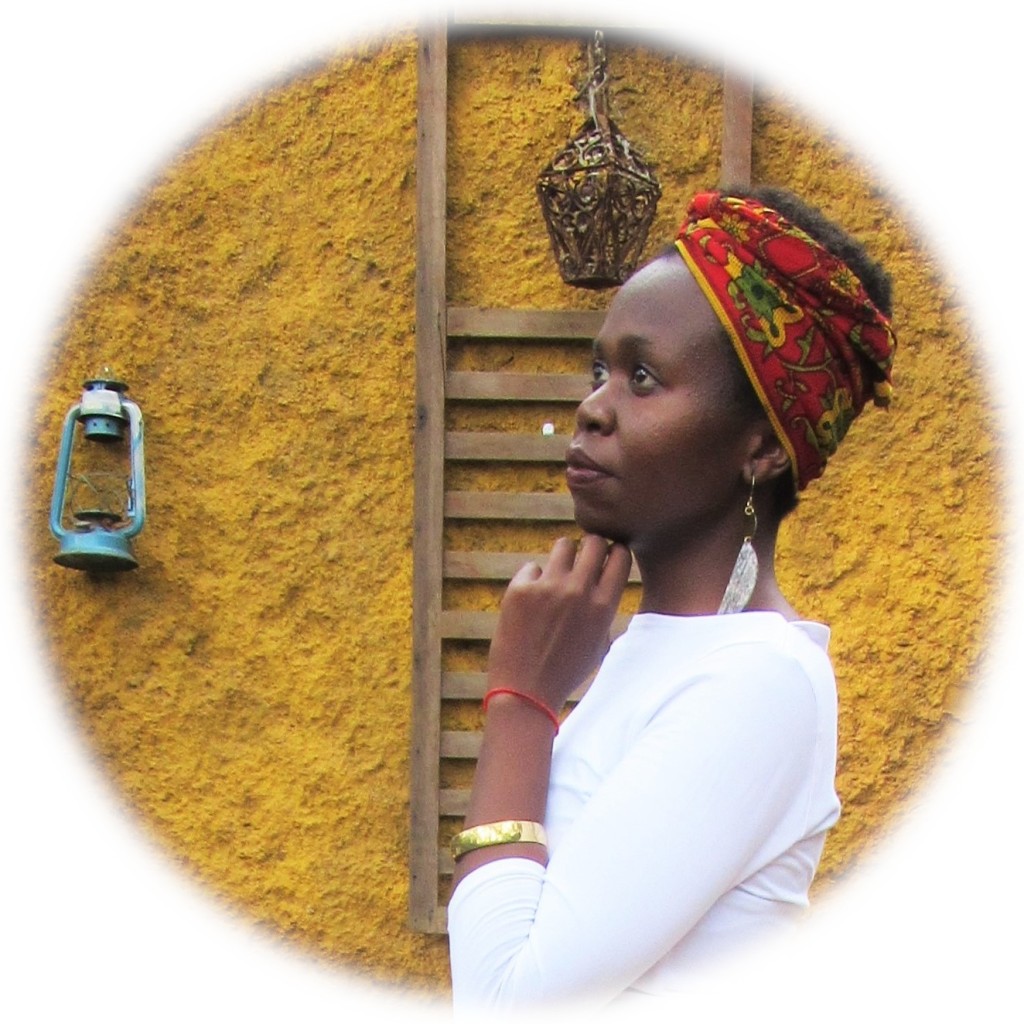
Wangũi wa Kamonji is a regeneration practitioner who researches and translates indigenous Afrikan knowledges into experiential processes, art and honey.
Read more
Her work is motivated by the twin challenge of healing and generating new realities for the present and future. Through research using academic and indigenous methods; storytelling in written and oral forms; traditional Afrikan dance and movement practice; and facilitating spaces for critical consciousness and transformation, Wangũi seeks to provide rooted embodied tools for Afrikans to heal the colonial traumas of past and present, and (re)create ways to live regeneratively with themselves, Earth and ancestors again i.e., for us to decolonise and reindigenise.
Her children’s story “The Giraffes of the Desert” appears in the anthology “Story, Story, Story Come”. Her essays are published on Open Global Rights, Africa is a Country, The Elephant, ChaKula Magazine and Transition Network. Her ancestrally inspired songs are shared on SoundCloud, and she has performed stories at the Re-imagined Stories Festival and the Great African Caravan showcase in Nairobi. She integrates poetry into her non-fiction to trouble borders and holds close Micere Mugo’s call to find the songs lying around us and sing them for all to hear. She is based in Ongata Rongai, East Afrika and online @_fromtheroots.
Minket
Lepcha
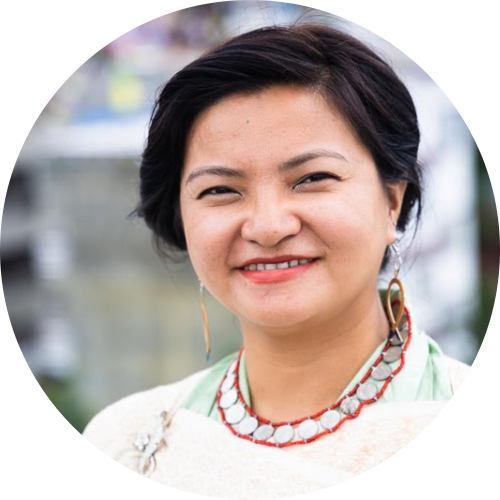
Minket Lepcha has been engaged with documenting stories and folklore based on ethnic communities of Darjeeling and Sikkim for few years.
Read more
She got an opportunity to direct a film on River Teesta through SOPPECOM and traced the river from the source till the river leaves the mountain. Having always been inspired by Lepcha folklore and believing that the ecological widsom are hidden in these stories, she creates workshop based on the folklore of Himalayan Communities. She uses this workshop tool to inspire, influence and educate young minds to connect with river and mountains and provide an experiential learning towards their surrounding rivers and mountains. She has been travelling narrating stories of river, seeds, birds, mystical creatures to school and college students across India and Nepal. She is an awardee of Young Green Filmmaker 2016 in Woodpecker International Film Festival for her film ‘Voices of Teesta’. This film also earned 10th position amongst 110 films in World Water Forum in Brazil 2018. She recently traced the old water sources of the World Heritage Site - Boudha of Kathmandu, Nepal using photographs as a medium to trace, evaluate and envision future of water around Boudha. The article is published in The Record. She has curated an online exhibition where 30 young girls from North East collected their river folklore with Living Water Museum titled ‘Visualising Water Heritage of North East India through Storytelling.’
Alyen
Leeachum
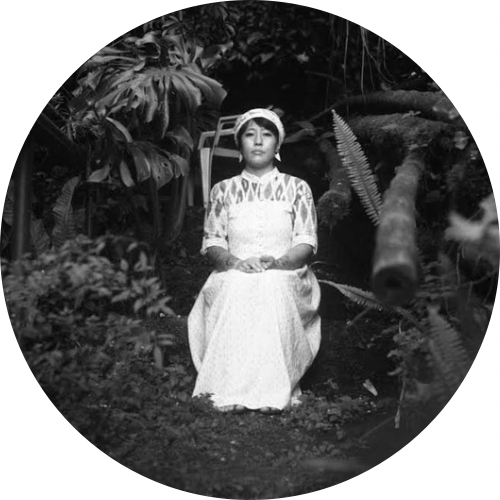
Alyen Leeachum Foning is an artist/designer and independent researcher who uses her art medium to connect with her ancestral roots.
Read more
She is a textile artist who has studied Textile and Apparel design at NID, Ahmedabad. Her works are inspired by Nature and indigenous world cultures. She is the creator of the installation ‘The Story of Munn’ ,which was exhibited at ‘So Many Feminisms!’ conclave by Godrej India Culture Lab in collaboration with Zubaan Books in February 2019. She also runs a design label-ALYEN FONING that believes in the power of Mother Nature, communities, upcycling and the skills of local artisans in creating contemporary and sustainable clothing and lifestyle products. Her label represents like minded people coming together to create, collaborate, celebrate, empower and give back to society in small, yet conscious ways. Leeachum feels deeply for fabrics, colours, collaboration with people, art, crafts, design and music in all forms. She is currently learning about her ancestral roots and shamanism through various research and art projects/grants, and is in a process of starting her training under a shaman of the Lepcha tribe.
Meena
Subramaniam
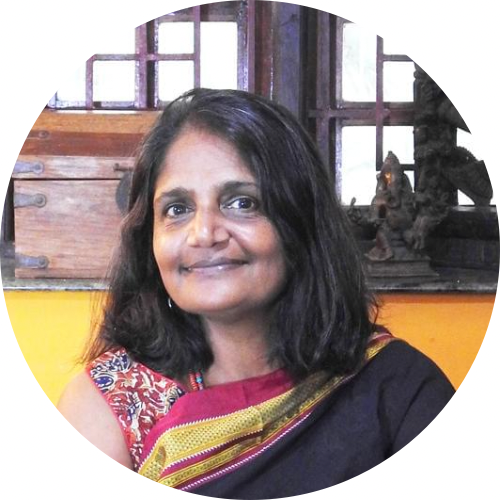
Meena Subramaniam is a nature and conservation artist who lives near PeriyarTiger Reserve.
Read more
Her work has been featured in several magazines, including Sanctuary Asia, The Indian Quarterly, with ecologist and writer, Suprabha Seshan in The Dark Mountain and the Marg issue, Ars Botanica.
She is also the recipient of the 2018 T N Khoshoo Memorial Award for pioneering work in ecological art, in 2018.
She has recently made a small contribution of illustrations for the tome, Trees of Arunachal Pradesh, NCF ad a poster for CF on fruit dispersal by frugivorous birds of Pakke forest, Arunachal Pradesh. Her preferred medium is Acrylic on canvas and occasionally water colours.
[email protected]
http://www.meenart.in
Danielle
Celermajer

Danielle Celermajer is a Professor of Sociology and Social Policy at the University of Sydney, Deputy Director of the Sydney Environment Institute and lead of the Multispecies Justice project.
Read more
Integral to her academic work is the intentional multispecies community in which she lives. Her publications include Sins of the Nation and the Ritual of Apology (Cambridge University Press 2009) and The Prevention of Torture: An Ecological Approach (Cambridge University Press, 2018) The Cultural History of Law in the Modern Age (Bloomsbury 2019), The Subject of Human Rights (Stanford 2020), and “Justice Through a Multispecies Lens.”
Through the experience of living through the black summer bushfires with a multispecies community, she began writing about a new crime of our age, Omnicide. Her latest book, Summertime (Penguin Random House, 2021) was written in recognition of the critical urgency of conveying the complex conceptual recognition of the multispecies harms of the climate catastrophe in ways that can provoke affect and hence action.
Sessions Recordings Playlist
You’ll find all the videos of the sessions in the playlist below.

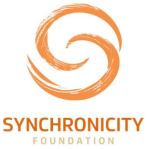

Inner Climate Academy (ICA)
ICA is a project of Social Entrepreneurship Association, a unit of the Auroville Foundation.
Quick links
We rely entirely on funding from grants and other donations to fulfill our vision, mission & purpose.